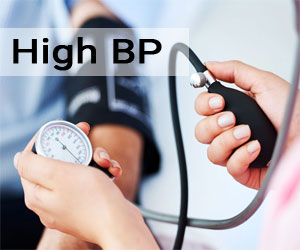- Home
- Editorial
- News
- Practice Guidelines
- Anesthesiology Guidelines
- Cancer Guidelines
- Cardiac Sciences Guidelines
- Critical Care Guidelines
- Dentistry Guidelines
- Dermatology Guidelines
- Diabetes and Endo Guidelines
- Diagnostics Guidelines
- ENT Guidelines
- Featured Practice Guidelines
- Gastroenterology Guidelines
- Geriatrics Guidelines
- Medicine Guidelines
- Nephrology Guidelines
- Neurosciences Guidelines
- Obs and Gynae Guidelines
- Ophthalmology Guidelines
- Orthopaedics Guidelines
- Paediatrics Guidelines
- Psychiatry Guidelines
- Pulmonology Guidelines
- Radiology Guidelines
- Surgery Guidelines
- Urology Guidelines
50 per cent of people with high BP not aware of their problem

50 per cent of people with high BP not aware of their problem, according to a new study.
About 50 per cent of Australians living with high blood pressure, BP do not realise they have it finds a study by scientists from The University of Western Australia and the Royal Perth Hospital Medical Research Foundation.
The research is part of a global study published in the European Heart Journal Supplements for May Measurement Month, a health campaign centred around Hypertension Day (Friday 17 May) to create awareness of high blood pressure.
High blood pressure, high BP accounted for about 10.4 million deaths in 2017 and it currently affects more than a billion adults globally with the figure forecast to reach 1.5 billion by 2025.High blood pressure, BPis the biggest contributor to cardiovascular death and disease worldwide, affecting about six million adult Australians.
The research found of 3817 people involved in the Australian component of the study, 31.2 per cent had high blood pressure and only half of them were aware of it. Of those who received treatment, 40 per cent still had blood pressure above the recommended level. People who smoked, drank alcohol or had cerebrovascular disease were at greater risk of having elevated blood pressure.
Australian study lead UWA Professor Markus Schlaich, who holds the Dobney Chair in Clinical Research at the Royal Perth Hospital Medical Research Foundation said the results were alarming.
“Even though effective treatments for this condition are widely available, only half of the people affected by it are being treated, and of those treated only 60 per cent are having their blood pressure adequately controlled,” Professor Schlaich said.
This tells us that the majority of people who have high blood pressure may have never had it measured and are unaware of their condition.”
35-year-old patient Michael Cornwall has suffered high blood pressure but is among those to seek detection early and now enjoys an improved lifestyle after treatment.
Mr Cornwall said since the treatment, his blood pressure had dropped from 140 over 90 to a more manageable 120 over 80 mmHg.
“A lot of younger people think it’s something that typically happens to older people or people that aren’t active but I’m proof that it can happen to young active people,” he said “Treatment is really easy and you can still lead a normal, healthy life.”
Professor Schlaich said high blood pressure didn’t always have obvious symptoms, but the consequences of leaving it untreated could be catastrophic, potentially leading to stroke, kidney or heart failure.
“We strongly encourage people to find out if their blood pressure is under control or if they have any undiagnosed issues,” he said.
“May Measurement Month 2019 provides a great opportunity for people to take advantage of the free blood pressure testing booths set up around Perth throughout the month of May.
“More than 2.7 million people had their blood pressure measured in May 2017 and 2018 and 150,000 people were found with undiagnosed hypertension. This year, we are hoping to take even more measurements and contribute to this global initiative and help the community.”
blood pressureBPelevatedEuropean Heart Journal Supplementshigh blood pressureHypertensionhypertensiveincreasedRaised
Next Story
NO DATA FOUND

Disclaimer: This site is primarily intended for healthcare professionals. Any content/information on this website does not replace the advice of medical and/or health professionals and should not be construed as medical/diagnostic advice/endorsement or prescription. Use of this site is subject to our terms of use, privacy policy, advertisement policy. © 2020 Minerva Medical Treatment Pvt Ltd